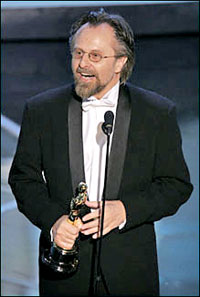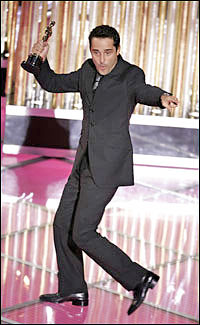 |
|
 Print this article Print this article
FMS FEATURE...

February 28, 2005
Muzyka do Filmu...Música de Cine...
Oscar's Score and Song nods exemplify film music as the international language
by Jon Burlingame

Jan A.P. Kaczmarek
Photo © 2005 Variety

Jorge Drexler
Photo © 2005 Variety
|
The 77th annual Academy Awards took on an international flavor with
awards in the music categories to Polish composer Jan A.P. Kaczmarek
for the original score of Finding Neverland, and
Uruguayan-born, Spain-based Jorge Drexler for the song "Al Otro Lado
del Rio" from The Motorcycle Diaries.
Accepting the Oscar from presenter John Travolta, Kaczmarek said,
"Finding Neverland was a great adventure, and I'm
so
proud to be a part of it." He thanked director Marc Forster and
producer Richard Gladstein, "a man who truly understands the power of
music." Kaczmarek also noted that he was "the first person in the
room to thank Harvey Weinstein," the Miramax chief who supported the film
about writer J.M. Barrie and the boys who inspired his Peter Pan.
He also thanked "the musicians, usually forgotten, but extraordinary
people who make music live and, without them, the best music just
doesn't exist." He acknowledged his wife Elzbieta ("She is
responsible
for many good notes I have written," a line that drew laughter from
the audience) along with "my collaborators in Poland and here in
America," music editor Christopher Kennedy, engineer Rafal Paczkowski
and pianist Leszek Modzer.
All four of Kaczmarek's fellow nominees were present, including John
Williams (Harry Potter and the Prisoner of Azkaban),
James Newton Howard (The Village), John Debney
(The Passion of the Christ) and Thomas Newman
(Lemony Snicket's A Series of Unfortunate Events).
All five composers were also on hand for Saturday night's pre-Oscar
reception given by the Society of Composers & Lyricists in Beverly
Hills. Insiders were already buzzing about Kaczmarek's probable win
because, as one agent pointed out, "Finding Neverland
is the only movie in the category that everybody liked."
Singer-songwriter Drexler's win for the low-key ballad from
The Motorcycle Diaries was a surprise to most
observers, but an especially satisfying one in that Drexler, though
not asked to perform his song on the telecast, did so a
cappella when he took the microphone to accept from presenter
Prince. He sang the first two stanzas, added simply "thank you,
gracias, ciao," and left the stage, Oscar held high.
"Al Otro Lado del Rio" ("The Other Side of the River") was the first
Spanish-language song to receive an Oscar nomination, and the first
foreign-language song to win since "Never on Sunday" in 1960. Asked
backstage why he chose to sing his acceptance speech, Drexler said
simply, "I really wanted to sing my song."
Producer Gil Cates' failure to ask Drexler to perform was reminiscent
of such past Oscar-show blunders as having Connie Stevens do Paul
McCartney's "Live and Let Die" (on the 1974 show) and Ann Reinking
to
sing Phil Collins' "Against All Odds" (1985). Actor Antonio
Banderas
sang "Al Otro Lado del Rio" with inappropriate, grating
electric-guitar accompaniment by Carlos Santana. To his credit,
Banderas seemed visibly pleased as Drexler finally got his chance
onstage.
Compounding the musical felonies, Cates – in an obvious and probably
fruitless attempt to milk extra ratings points for ABC – asked pop
star Beyoncé to sing three of the five nominated songs. She ruined
"Vois sur ton Chemin" ("Look to Your Path"), the charming French
choral piece from Les Choristes, and the American
Boyschoir backing her was so muted they might as well have stayed home.
She destroyed the tender ballad "Learn to Be Lonely" (from
The
Phantom of the Opera) by belting it out at the Kodak Theatre
to, we're sure, the chagrin of composer Andrew Lloyd Webber, who was
accompanying her at the piano (Minnie Driver sang the original). And
Josh Groban, for whom Alan Silvestri and Glen Ballard wrote "Believe"
(from The Polar Express) was forced to share the song
as a duet with the over-the-top diva.
Oscar did, however, pay tribute to three giants of film music who died
last year. Footage of David Raksin, Elmer Bernstein and Jerry
Goldsmith was featured in the "in memoriam" segment, and four of
their most memorable compositions for film (Laura,
The Magnificent Seven, Star Trek: The
Motion Picture, and Chinatown, respectively) were performed by conductor
Bill Conti and the Oscar orchestra during commercial breaks.
Introducing the segment as "a requiem for movie memory-makers who left
us last year" – which featured cellist Yo Yo Ma performing Bach –
actress Annette Bening said: "From the first piano player who
pounded
out bars of Rossini's William Tell Overture during a
chase sequence in a silent movie house, music has been film's
handmaiden. Music provokes laughter, encourages tears, awes and
frightens, and comforts us. Our musicians evoke the exciting promise
of an overture, the pageantry of a parade, and the solemn dirge of a
farewell."
Goldsmith's "Fanfare for Oscar" – composed in 1998 to herald the
annual proceedings – was disappointingly relegated to a twenty-second
excerpt during the introduction of Academy of Motion Picture Arts and
Sciences President Frank Pierson. Conti's new Oscar theme, heard
throughout the evening, featured a Copland-esque opening fanfare and
an odd, tribal-percussion beat.
Another unfortunate Oscar misstep was the axing of a number that Robin
Williams had hoped to sing as part of his presentation of the Animated
Feature Oscar. To lampoon conservative critic James Dobson's recent
suggestion that SpongeBob SquarePants was gay, Williams asked
Tony-winning, Oscar-nominated composer Marc Shaiman and partner Scott
Wittman to pen what The New York Times called "a mock
expose of the dark underbelly of cartoonland."
The lyrics included: "Pinocchio's had his nose done, Sleeping Beauty
is popping pills, The Three Little Pigs ain't kosher, Betty Boop works
Beverly Hills!" And, later: "Fred Flintstone is dyslexic, Jessica
Rabbit is really a man, Olive Oyl is really anorexic and Casper is in
the Ku Klux Klan!"
ABC's Broadcast Standards executives reportedly objected to the
"sexual tone" of some lines (such as "Josie and the Pussycats
dance on
laps"), drug references ("The Road Runner's hooked on speed")
and
potentially offensive material about Native Americans ("Pocahontas is
addicted to craps"). When the network wanted as much as a third of the
song rewritten, Shaiman and Wittman gave up. Williams incorporated
some of the material in his remarks.
©2005 Jon Burlingame

|
 |



|
Error: DISTINCT YEAR query failed | |



